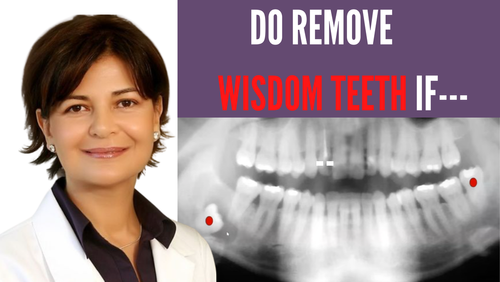We've got some special guests today: Dr. Afzali, aka Dr. Wisdom Teeth. And we did a video about when you should remove your wisdom teeth and another one about when you shouldn't. If you haven't seen those yet, check them out before watching this one! Today we're going to talk about when you should remove your wisdom teeth—and here are four conditions that might make that necessary:
1. Pathology
So, first off, pathology is a disease. One of the things that can happen when you're dealing with pathology is that there is an accumulation of fluid in the area. That's called a cyst, and if it continues to grow, it forms a little sack around itself and then eventually breaks through that sack and comes out on its own—but sometimes something goes wrong and that sack doesn't break through, and instead just stays there accumulating more materials. That's what we call an abscess, which can be common in wisdom tooth areas as well as other areas.
So if you have a cyst or an abscess around your wisdom teeth or any other part of your mouth, you definitely want to remove it as soon as possible because it can cause problems down the road! If you have a wisdom tooth growing in, you might want to get it taken out. It's possible that it will come in at an angle and damage the second molar—or even come out altogether.
2. TMJ
If you think about it, TMJ is just your jawbone and the muscles around it. It's kind of like a hinge that opens and closes every time you eat or talk. But what happens when something goes wrong with that hinge?
One of the most common problems is uneven contact between your upper and lower teeth. If one tooth is higher than another, this creates an uneven surface for your bite to rest on. This can cause long-term muscle spasms in the face, and it can even affect your ability to chew food properly.
The good news is that this problem is easy to fix—if you catch it early enough! If you're starting to notice muscle spasms in your face or trouble chewing food, schedule an appointment with your dentist as soon as possible. They'll be able to tell if there's anything wrong with the way your jawbone moves around inside its socket, which could lead to serious problems down the road if left untreated.
3. Wisdom Tooth
So now we are going to talk about the third condition, which is wisdom teeth.
If your wisdom tooth has cavities like this one, you see that both of them have cavities on the side that touches the adjacent tooth, and the adjacent tooth has already developed cavities from the wisdom teeth. You see that this one isn't fully in its socket, it's tilted to one side. This is another version of a horizontally positioned tooth. The crown is out and the root is tilted, and of course it has a cavity in it.
We are covering two things here: One is if you have extensive cavities on this plate that adversely affects your adjacent tooth like this one does or is not useful to have any point of contact with your healthy tooth because it's not straight and it's not having any useful function in your mouth, so why keep something like that? The other thing we're covering is if you don't have any pain right now but still want to get your wisdom teeth removed because they could cause complications later on. Remember: Pain is just one indicator; it doesn't give you the whole story!
4. Mandibular Nerve
So the fourth condition I have here is that this tooth is very close to the nerve. This is the mandibular nerve, which goes from here to here. It's also called the lower jaw.
Now, this type of impaction can be painful for some patients. But not all of them will be affected by it. Mostly it depends on how much pressure they feel when this tooth is in their mouth.
In most cases, I recommend getting a wisdom tooth removed if it's covered in bone and you're 22 years old or younger—ideally even younger than that. The reason is that these teeth are easy to remove—they don't require much surgery and they don't cause much discomfort afterward.
You know, it really depends on your goals. If you're looking for alignment, and you want to get your teeth straightened out, then obviously having the wisdom teeth come in is not going to help with that. But if you're not interested in alignment, or if you have enough space between your teeth so that the wisdom teeth don't cause any crowding, then there's no reason not to keep them in. They've already come in and are there, so why not?
But if you do want alignment, then removing the wisdom teeth can really help with that. And if they're causing crowding or pain, then by all means—remove them!

